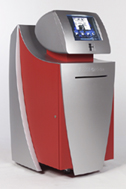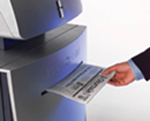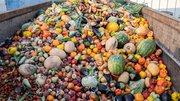Article
Read all about it
A Dutch company plans to scoop the market by bringing internationally known newspapers to upscale hotel patrons through kiosks.
February 9, 2002
For the tourist or international business traveler, the advent of the laptop, e-mail, and the Internet has transformed logistic and communications hassles into a seamless operation. When it comes to staying in touch with home, going on the road has never been easier.
But getting a copy of one's favorite newspaper to take to the breakfast bar or the conference room is another matter entirely. While most papers now put their current editions on the World Wide Web, reading it from the road requires being confined to one's room or the hotel's Internet access area. Taking it poolside or to the golf course generally is not an option.
A Dutch company hopes to alleviate that problem while filling a niche market. And their solution to the problem involves kiosks.
PEPC Worldwide, based in The Hague, Netherlands, has created PRESSPOiNT, a kiosk that prints daily newspapers on 8 ½-by-11 inch paper. Having spent 3 ½ years in the design and testing phase, PEPC began rolling out the kiosks this past October and have already deployed units at hotels and conference centers on four continents.
The locations are upscale, and PEPC is targeting an upscale clientele for its product.
"With its service PEPC targets international travelers, both business and leisure," said Joris van Dijk, PEPC director of marketing and communications. "Target locations are upscale venues where international people congregate such as hotels, airports, convention centers, and cruise ships."
Run that baby!
The PRESSPOiNT concept was developed in 1998 by PEPC chief executive officer Raoul Maphar, who was seeking a way to deliver fresh, up-to-date news to businessmen and travelers.
"From the simple idea to the concept as it is currently rolled out took about 3 ½ years," van Dijk said. "In that period we developed the software and hardware components for the vending unit, we set up a control center and we established the digital distribution network as we currently operate it."
 |
PEPC Worldwide's PRESSPOiNT kiosk provides access to more than 60 daily newspapers. |
Member newspapers send digital copies of their recent editions to PEPC's distribution network, where an eight-step automated process formats the papers for the kiosks, a process that usually takes about 20 minutes, according to van Dijk. The kiosk-ready edition is then transmitted through a satellite network to each kiosk.
A touchscreen allows customers to navigate through the kiosk until they find the paper they want to purchase. The kiosk prints, collates, and staples the paper before it is delivered. PEPC plans to add video advertising to the touchscreen to enhance its revenue potential.
There is no archives section on the kiosk; only the most recent edition of each paper is available on the site. Both daily and weekly papers are available through the kiosk.
At the moment, more than 60 papers from nearly 35 countries are available. Leading American papers include the Atlanta Journal & Constitution, Christian Science Monitor, Miami Herald, and San Francisco Chronicle. International newspapers include Germany's Die Welt and Japan's Mainichi Shimbun.
The entire world
PEPC has designated dealers to install and service the machines throughout North America, Europe, Asia, and Africa. The company expects to install machines in Australia later this year.
The dealers work out contract arrangements with the businesses that host the kiosks. The revenue generated by each machine is determined by the contract.
"The amount per sold newspaper copy for the location owner depends on the agreement he has with the official PEPC dealer in his region," van Dijk said. "When the location holder buys the PRESSPOiNT from the dealer, he determines the price of the newspapers and includes his royalty in this price. When the location holder chooses to let the dealer stay owner of the PRESSPOiNT, the dealer decides on what terms and conditions the revenues are settled."
Kevin Drinan, the IT manager for the Rosen Centre hotel complex in Orlando, Fla., said his hotel entered a revenue-sharing arrangement with their dealer before deploying a PRESSPOiNT in the hotel at the end of December.
"What we make depends upon how many papers are sold," Drinan said. "It was lucrative to us. We have a lot of outside clients coming to us from around the world. For us, it's an added amenity we can offer our customers."
Drinan said the machines have generated traffic, but he could not give any reasonable figures because of the short time the kiosk has been in operation.
The Rosen is one of nine locations for PRESSPOiNT kiosks in the United States. Four are located in Florida, two in Connecticut, and one apiece in New York, Hawaii, and Nevada.
Competition is healthy
PEPC is not the only company trying to succeed by selling newspapers to international travelers. NewspaperDirect currently distributes print stations to hotels and tourist destinations in five cities in the U.S., Canada, and Russia. The print stations, which look like copier-fax machines, print out 8 ½-by-11 inch versions of daily newspapers, including USA Today, the Wall Street Journal, the International Herald Tribune, and the Times of London. The centers then distribute the copies as requested.
 |
Before they are delivered to customers, newspapers are printed, collated, and stapled. |
While acknowledging the similarities between both companies, van Dijk said the kiosk concept provides a level of convenience for tourists and business travelers.
"We both work with a distribute-then-print model - instead of the print-than-distribute model that newspapers have been using for ages - that eliminates international shipping costs and increases the timeliness of the content," he said. "PEPC has executed this concept in a different and unique way by developing a stand-alone, easy-to-use, and fully automated vending unit."
PEPC did not disclose how much each unit costs or how much the project has cost to this point. According to van Dijk, the company did not achieve profitability in 2001, but expects to get there this year.
"The moment when and amount of (profit) depends on many conditions such as the number of machines installed, the number of sold copies per machine, and the number of commercials we sell," he said. "Our target is to install 1000 machines globally in 2002."
 ChatGPT
ChatGPT Grok
Grok Perplexity
Perplexity Claude
Claude









